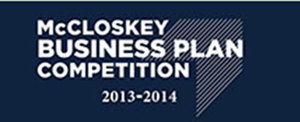The real prize of the McCloskey Business Plan Competition
Published: October 14, 2013 / Author: Carol Elliott

Charles Florance had been kicking around the idea of starting a premium whiskey micro-distillery for several years, just as a hobby. At the time, he had cycled through a couple of successful careers, including a 12-year stint in the Infantry, and had just started the Notre Dame MBA program.
In a what-the-heck moment, Florance decided to pitch his idea during the annual Ideas Challenge sponsored by the Gigot Center for Entrepreneurship—a rollicking one-night event where would-be entrepreneurs present their best two-minute elevator pitches one after the other, with an enthusiastic audience providing feedback.
That was his stepping off moment.
“The audience loved the idea,” says Florance. “We won an iPad 2. But more importantly, the response gave me courage to go forward.”
“Going forward” for Florance meant entering the McCloskey Business Plan Competition, the Gigot Center’s yearlong event. Since 2000, hundreds of teams of Notre Dame students, alumni and even faculty members and others have entered the competition.
The first “official” step in entering the McCloskey Competition involves registration and submission of a two-page overview of the proposed venture by the Round 1 deadline. For the 2013-14 competition, that deadline is 5 p.m. EST on Friday, Nov. 1.
Each team must include at least one full-time ND student, faculty member or alumnus/alumna. Teams who wish to include non-ND individuals may do so, as long as the team/venture is led by the Notre Dame student(s), faculty or alumni.
Submissions must be for ventures that have not yet been launched or are at the earliest stage of launch. These are typically defined as ventures that have earned less than $500,000 in cumulative revenue, received less than $500,000 in external financing, or been in operation for less than three years.
As participants move through the subsequent rounds of the competition to the semifinals and ultimately the live final event in the spring, their plans progress as well: from the initial two-page overview; to a 10-page written plan that includes detailed descriptions of critical considerations such as funding, target markets, cost structures and revenue analysis; to a full-fledged business plan plus presentation – essentially, the ability to not just develop a plan, but to effectively sell a vision.
“Our entries range from brand new ideas to fledgling business ventures that need help understanding how best to grow and sustain the business,” said Karen Slaggert, Gigot Center associate director who oversees the McCloskey Business Plan Competition. “That’s really where the value in participating in McCloskey lies – getting expert advice and access to resources.
“We usually have well over 100 business plans entered each year, and obviously the larger percentage of them are not going to win. But there are still important takeaways that help the entrepreneurs move their plans further down the road toward becoming a successful venture,” she added.
The resources include mentoring, feedback, online access to business planning tools, entrepreneurs-in-residence, networking and much more, said Slaggert. And, of course, the prizes for winning ventures, which tops $300,000 in cash and in-kind prizes.
Florance’s venture, Indiana Whiskey Company, eventually won $5,000 in cash and banking services. Today, the South Bend, Ind.-based distillery employs five people in producing its premium liquor made entirely from Indiana resources – from the corn and barley, to the specially designed stills. “By Hoosiers, for Hoosiers,” says Florance, which seems like a modest goal until he points out that Indiana residents spend more than $100 million a year on whiskeys that come from Tennessee, Kentucky and Canada.
“How valuable was the experience of participating in McCloskey? I would say that the cash prize, while valuable, didn’t make up a large part of our capitalization,” he says. “The real prize was getting our business plan in front of people who had a lot of expertise and experience in reviewing plans.
“Anyone would be hard pressed to express even a great business plan in 10 pages. Having people who can sift through the soft language and ask the hard questions – what’s your capital structure, how many employees will you need – hearing that degree of advice was unparalleled. It takes away a lot of junk and forces you to be concise.”
Florance also can name off specific individuals who came along side to advise and encourage him, from Gigot Center staff members to ND alums serving as mentors and advisors.
“I can honestly say that this business would not be around if not for the McCloskey Competition,” he says. “We have so many things going on every day. Our attention is all over the map. But I would not trade this for anything. Being an entrepreneur and knowing what impact you have on the community, and that you’ve produced something you can put your fingerprint on … There’s nothing like it.”
/news_and_events/news_articles/article/13436/the-real-prize-of-the-mccloskey-business-plan-competition




